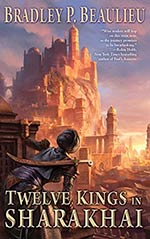
![]() Nymeria
Nymeria
12/24/2015
![]()
This book was bound to be appealing for a long-time fan of the Dune saga: the setting, a desert world shrouded in mystery; the main character a strong woman in search of vengeance and answers to old questions. I did find all of this in Twelve Kings in Sharakhai, but also much, much more.
The city of Sharakhai is a center of power and culture in the arid wastelands that are the background of this compelling story: other places are mentioned, of course, but Sharakhai clearly stands over them all, and not only because it's the chosen residence of the titular Twelve Kings, men endowed with some mystical power that has allowed them to live for centuries and hold sway over the land. There is also a rich complexity to this city that unfolds slowly but surely as the story progresses, giving the impression of a wondrous tapestry being completed before our eyes.
There are many elements that catch a reader's attention here: the lively, colorful background of the city itself with its busy markets and shops, but also with its places of learning and worship; the people themselves, interacting with each other in a way that brings their lives into sharp relief, making them so three-dimensional and real that it's easy to picture them in the mind's eye; the ships that travel over the endless sands on special wood runners as more conventional ships would over water - one of the best side details of this story; the arena where local fighters pit their strength and abilities against each other and visiting champions, staging bloody combats for the cheering and betting crowds.
It's in such a place that we first meet the book's main character, Ceda: she is one of Sharakhai's gutter wrens, the young people (even children) who live at the very margins of society, adding to the intricate and colorful background supporting this story. The best way to describe Ceda is to say she's a fighter, and on so many levels: as the book opens she's competing in the pits in one of the many gladiator-style matches the city is famous for, but as the story unfolds we discover she's haunted by her mother's gruesome death at the hand of the Kings, and she spends most of her time, energy and resources in seeking the truth about this defining event in her life. The author chose an intriguing, non-linear way of building Ceda's past for the readers, alternating flashback chapters with others that carry the story forward, and doing so in such a fluid, organic manner that I felt literally swept away by the rhythm of this tale, as a sand ship traveling over the desert wastes.
Ceda is a very complex figure, and not your "regular" heroine at all: she's often impulsive, and at times utterly focused on her mission, to the detriment of the many human ties she's built over the years. Not a perfect person, then, not by a long shot, and for this very reason she's far more intriguing and fascinating, so that the way she interacts with other people and the conflicts that arise from those interactions help shape both the characters and the story with a very satisfying sense of reality. Indeed, all the other people surrounding Ceda feel just as substantial as she is: starting with Emre, her childhood friend, confidante and one-time lover, who is a complex character on his own and whose path through the story is equally fascinating; or the apothecary Dardzada, for a while Ceda's guardian after her mother's death, with whom the young woman has a difficult relationship made of equal parts of grudging affection, rebellion and the shadow of unspoken truths.
As these characters move through their individual story-arcs, that intersect with each other in fascinating ways and help shape them into such well-crafted three-dimensional figures, we become aware - brush stroke by brush stroke - of this complex world and its past. The flavor is that of a blend of myths and history, the former ultimately shaping the latter through the Kings' desire to alter the perception of the past to better rule the present: this is one of the elements that I appreciated most in this book, the creation of an intriguing world that takes some known elements (the One Thousand and One Nights tales come to mind) and shapes them into something new, believable and totally immersive, adding compelling details like the asirim - the demonic creatures coming from the desert to exact a tribute in living beings - or the Blade Maidens, the Kings' elite guards, a sort of fighting monastic order with its rules and code of honor.
As the first volume in a saga - and a very promising one at that - Twelve Kings in Sharakhai is very satisfying because it ends without a cliffhanger but at the same time it sows the seeds for future developments, while managing to keep many questions unanswered and many of the riddles unsolved. There's a nice parallel here with the poems/riddles left to Ceda by her mother in a book that's her most precious possession: as she struggles to find the hidden meaning of those words, to find the clues that will help her fulfill the burning need for vengeance, so we readers struggle (quite happily so) to follow her on her quest. It's this total immersion in the story that captivated me from the very beginning of the book, the sheer joy of losing myself in the many details that build this world and never feel like exposition: it's a rare privilege to find this kind of story, the kind you don't care coming up for air from.
For once, I'm not begrudging the fact that I find myself tied into another series, because this is one of those that are totally worth the wait between books.
http://spaceandsorcery.wordpress.com